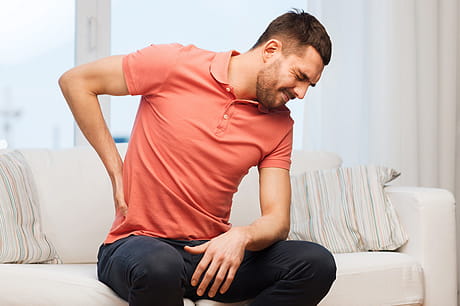Can kidney stones lead to chronic kidney disease?
If you or someone you know has had a kidney stone before, you probably heard them describe the excruciating pain. What may start out feeling like a stomachache or some lower back pain can quickly become unbearable as your body tries to pass the stone.
Though painful, a kidney stone typically does not cause damage. However, kidney stones can be a sign of other health issues.
“More people are getting kidney stones, which is cause for concern because of the factors that contribute to kidney stones and what can happen if kidney stones keep recurring,” said Prince Mohan, M.D., medical director of Transplant Nephrology at Geisinger.
Typically, any waste that builds up in the kidneys is dissolved in the liquid that passes through them. But when there is a high level of minerals or salt and too little liquid, kidney stones begin to form. Usually, kidney stones that stay in the kidney aren’t noticeable.
The pain is a result of the kidney stone beginning to move from a kidney to the bladder through a tube called the ureter.
“Most people don’t know they have a kidney stone until they begin to feel severe pain in the side or abdomen, nausea, or if their urine is pink or red,” said Dr. Mohan. “They may be diagnosed in the emergency department after experiencing severe pain.”
To confirm the diagnosis, your doctor may conduct a CT scan, ultrasound or x-ray to look at the size and location of the kidney stone. Your doctor will also ask you about your medical history to see if other family members have kidney stones.
After the diagnosis is confirmed, most patients pass the stone naturally. It is very important to know the kind of kidney stone the patient has. The best way is to catch the stone using a strainer. Your doctor might order a stone risk profile; urine is collected for 24 hours for this test.
“Having one kidney stone increases the risk of developing another one,” said Dr. Mohan. “This also increases the risk of chronic kidney disease and kidney failure.”
Chronic kidney disease is the gradual loss of kidney function over time. If it’s not treated properly, chronic kidney disease could progress until one or both of the kidneys stops functioning, called kidney failure. The only way to treat kidney failure is with dialysis or a kidney transplant.
“The best way to keep your kidneys healthy is by doing everything you can to prevent kidney stones from developing in the first place,” said Dr. Mohan.
Kidney stones develop when waste builds up in the kidneys. Drinking plenty of water helps to lower the ratio of waste to fluid passing through the kidneys.
“You should drink eight to 10 glasses of water every day to stay hydrated, and more if you are active,” said Dr. Mohan.
In addition, your doctor may recommend diet changes based on your stone risk profile to prevent kidney stones in the future. For example, a high-sodium diet increases the amount of calcium in urine, which can trigger kidney stones. Guidelines recommend limiting sodium to 2,000 milligrams per day. However, if you have a history of kidney stones, you should aim to keep sodium intake under 1,500 milligrams.
You should also get plenty of calcium in your diet that helps with oxalate stones, and eat fruits and vegetables, which can lower acid levels in your urine.
“Kidney stones are just one risk factor that could contribute to chronic kidney disease,” said Dr. Mohan. “If you have had them in the past, it’s important to talk to your doctor about other risk factors and how you can prevent chronic kidney disease.”

